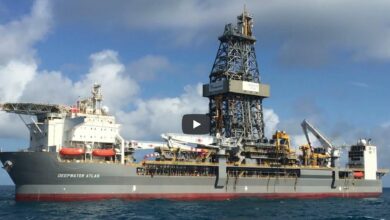ExxonMobil makes significant discovery in Owowo field offshore Nigeria
Exxon Mobil Corporation has announced a significant discovery with a potential recoverable resource of between 500 million and 1 billion barrels of oil (BOE) in the Owowo field offshore Nigeria.
The Owowo-3 well, which was spudded on 23 September, encountered about 460 ft (140 m) of oil-bearing sandstone reservoir. Owowo-3 extends the resource discovered by the Owowo-2 well, which encountered about 515 ft (157 m) of oil-bearing sandstone reservoir.
“We are encouraged by the results and will work with our partners and the government on future development plans,” said Stephen M. Greenlee, President of ExxonMobil Exploration Company.
Owowo-3 was safely drilled to 10,410 ft (3,173 m) in 1,890 ft (576 m) of water. The Owowo field spans portions of the contract areas of Oil Prospecting License 223 (OPL 223) and Oil Mining License 139 (OML 139). The well was drilled by ExxonMobil affiliate Esso Exploration and Production Nigeria (Deepwater Ventures) and proved additional resource in deeper reservoirs.
ExxonMobil holds 27% interest and is the operator for OPL 223 and OML 139. Joint venture partners include Chevron Nigeria Deepwater G Ltd (27% interest), Total E&P Nigeria Ltd (18% interest), Nexen Petroleum Deepwater Nigeria Ltd (18% interest) and the Nigeria Petroleum Development Company Ltd (10% interest).




